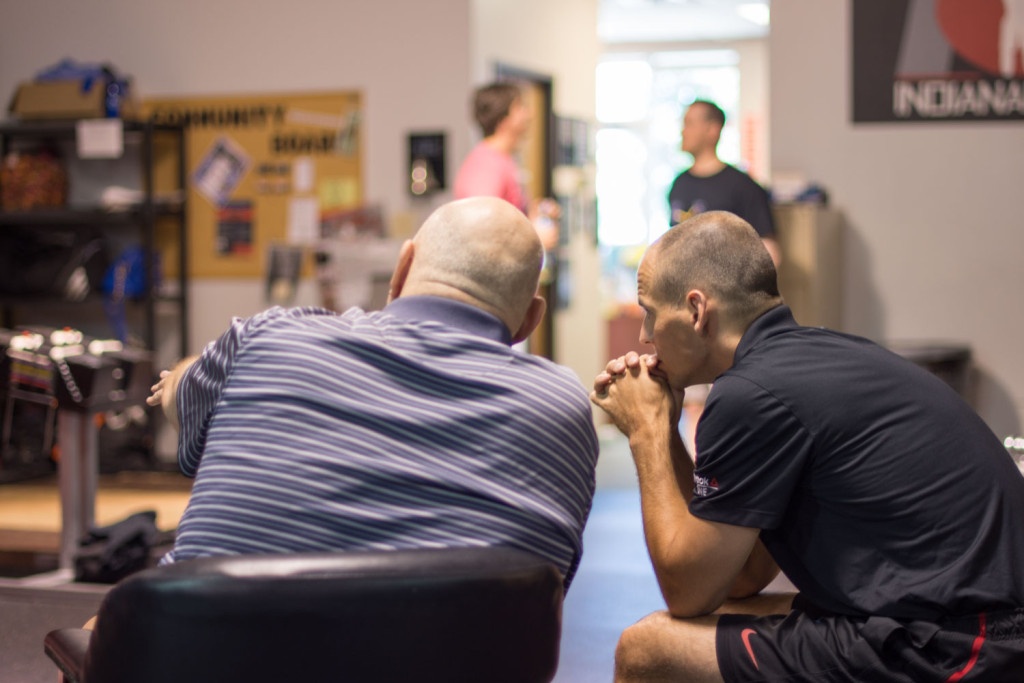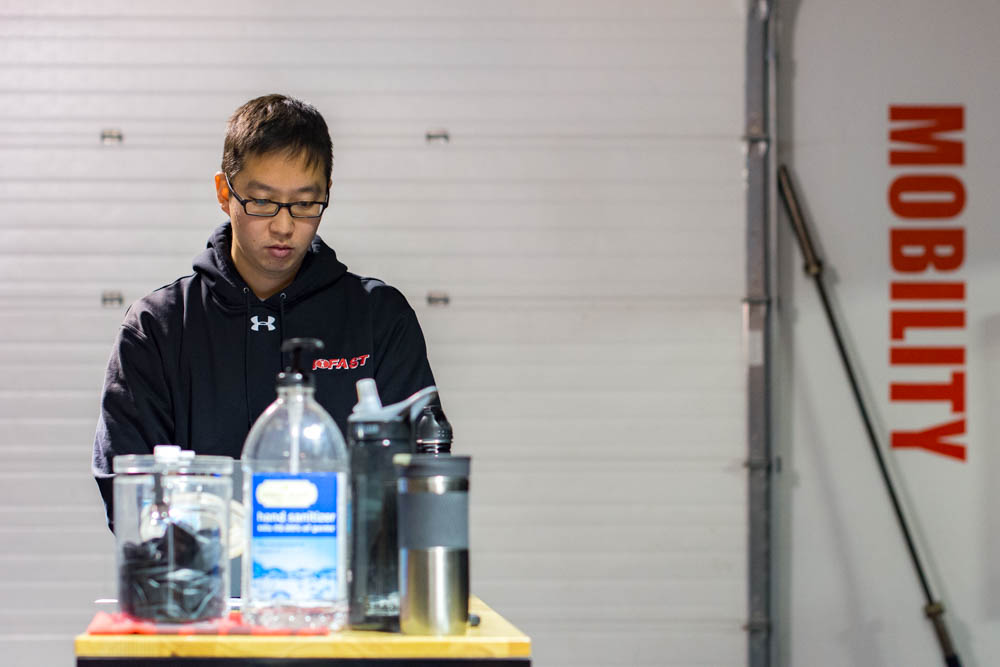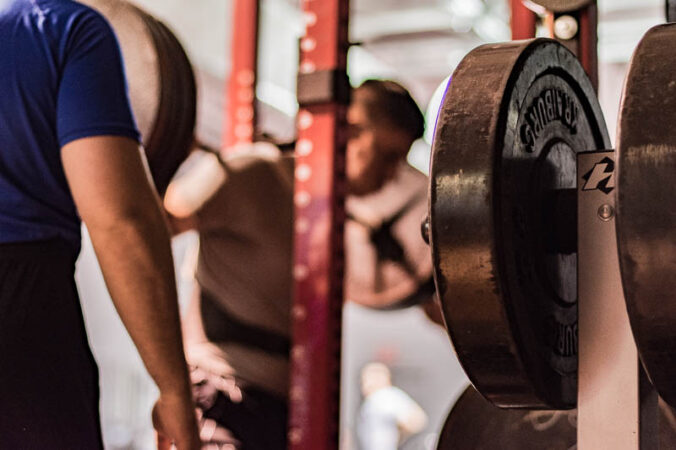Imagine you’re a personal trainer. You’ve just told a group of ten of your clients to do barbell front squats, and now they appear to be doing their best impressions of a dying worm. Like a broken record, they’re repeating the phrase, “I can’t do it.” Two of them complain that the exercise is uncomfortable and their wrists hurt.
Due to limitations of manpower, equipment, and time, you have two responses to choose from:
- “Okay. Let’s take you back down to the kettlebell front squat we always do.”
- “Okay. Can you keep going or do you need an alternative?”
Worth noting, you must convey sincere nonverbal and verbal compassion in your response. Obviously, there are other things you can do, such as kick them in the groin and tell them they’re being a child, but the two listed above are the top two choices in my mind. Feel free to discuss alternatives in the comments below.
So which option do you pick?
Strength of Character
Let’s do a little role play. You’re the Head of Admissions at Harvard University. What do you need to know to determine if the applicant has the character necessary to thrive on your campus?
Immediately, I picture a child who grew up in poverty, never met his father, and is of some ethnic minority. But he remained diligent, achieving good grades in school while playing basketball and working for minimum wage. He wants a nice job some day. His high school experience shows that he can beat the odds.
Now let’s picture another child: a Caucasian male whose mother stayed at home to take care of him and his siblings while his father practiced as a general surgeon. A wealthy household with a strong family dynamic. This child achieved high grades in advanced placement (AP) classes, played two sports, and headed a club at school that planted trees throughout the community once a month.
As the Head of Admissions, which one of these applicants has stronger character?
Hearing these stories, I would immediately say the first kid. His story makes me want to cry tears of joy. But is that fair to the second kid? His story isn’t nearly as emotional, but did he not apply himself just as much as the first kid?
Humans are predictably irrational, and our biases can have negative, positive, or neutral effects. Check out this book review and this article for more instances.
I would argue that instead of relying upon this “gut feeling”, it’s better to ask two questions:
- Where did you start?
- Where are you now?
If I’m evaluating character, I want to know if you push yourself. I want to know how far you’ve come. I want you to be above the average of your peers.
I’ve been lucky enough to grow up without much social or economic distress. This is a privilege. Instead of resting in the comfort of mediocrity, I prefer to challenge myself.
But I haven’t always thought that way.
The Emergence of a Coddling Mindset
I was raised to work hard. When I first started lifting weights, I saw more progress than almost everyone else. I am not a physical specimen by any means, I was just more consistent with my training than my teammates. I kept busting my butt in the gym, my strength increased, but eventually, I found pain. Hip pain, back pain… whatever pain.
Now looking back, the programming I wrote for myself was moronic, but it’s okay because I didn’t know any better. I later learned about overtraining and the nonspecific stress response. I got stuck on this idea that I don’t want to exceed my capacity to recover because I don’t want my hips to hurt anymore. When I’m not feeling good, I dial things back.
Now there’s substance in this. Work and life stress undoubtedly hinders your ability to handle more training stress. And when in doubt, primum non nocere; first, do no harm. But if you err too far on the side of caution, you don’t grow. Not all stress is bad. Some people don’t realize this.
A life without stress is amoeboid purposelessness.

Becoming a Sadist
Looking back, some of my best training experiences have come from some of my most masochistic moments. Coddling my clients deprives them of this experience. Remember the Golden Rule? Treat others the way you would like to be treated. Well I would bust my butt when training, so I guess I should push them the way I push myself.
But there’s a fine line between helpful and harmful. Walking that line is the art of coaching and reading people. How can I dial in my level of cruel to be “haha” cruel and not “I’m leaving and never coming back” cruel?
When coaching others, I will most often lead my clients to making their own decisions. If we think back to the opening example of front squats, I’m probably going to choose something closer to the second response:
“Okay, can you keep going or do you need an alternative?”
My assumption is that if this experience is truly harmful, you’ll tell me. Interpersonal trust and comfort are the foundation of my coaching style. Without these qualities, you would fail to tell me the things I want to know, and, consequently, I would be operating off of inferior data. A good decision with bad data is usually a bad decision.
I want you to be comfortable with being uncomfortable. Kind of a side bar, but if you really want to get uncomfortable in the gym, buy this insane book and don’t look back.
The transfer of your training to sport is often discussed, but how does your training transfer to your life?

Transfer of Training
I wish I had applied myself in high school and early college. I wish I had done more extracurricular things. I wish I had explored different parts of the world. I’ve written about this regret before. I’m sure someone smarter and more articulate than I has said this before, but it’s sad that youth is wasted on the young. Live and learn, I suppose.
My sister is much more intellectually gifted than I. She’s in her junior year of high school now, which is notoriously the hardest year. I don’t want her to make the same mistakes that I made, so when she was registering for her classes last year, I pushed her to comprise the toughest schedule possible. I’m happy to report that my manipulation was successful.
When this school year started, she was a wreck: stressed out, full of worry over her grades and fear over the difficulty of her classes. She started out doing poorly in a high level math class. When she tried to drop it, they told her no.
Is this “haha” cruel or “I’m leaving and never coming back” cruel? While she thought it was the latter, I know it was the former.
She had deliberated for a while before requesting to drop the class. Once she finally worked up the courage to ask, her teacher said, “Madison, I really don’t want you to drop this class, so I’m not going to let you.” Then she started crying. She was worried she couldn’t handle it because she’s almost coasted up until this semester, which is the very reason I encouraged her to challenge herself.

I just laughed and smiled. Irony is beautiful art. Back in high school, I slept through average level math classes and got A+ grades. This fact is unimpressive. Actually, it’s even more unimpressive than getting C grades in those classes. Why? Because I was sitting on my abilities, coating myself in a thick carapace of disgusting comfort. The fear of failure was [is?] unnecessarily dictating my life. You know what’s actually impressive? Getting special permission to enroll in a medical neuroscience course for which you’re totally unqualified and passing the final exam a.k.a. neurology board exam at the end of the semester. Stay tuned to hear more about Brandon Brown.
After getting over the heartbreak of having to stay in a difficult math class, Madison said, “F*** it, I’m just gonna sleep less.” She toiled away, stayed up late, and woke up early. Her preliminary grades were lower than she is accustomed to, but they came up to her normal high level.
“Lance, you know how I wanted to drop math? Well, now I’m doing better than all of my smart friends.”
She put in some serious effort all semester. Now it’s finals week and she’s not cramming for a single class. You would think she’s already done and on break. Isn’t it cool how hard work pays off?
What Does It Mean to Be Nice?
What does it mean to be nice to someone? Does it mean that you make their every moment as easy as possible? Or does it mean that you look to develop them over the long term, even if it means discomfort in the short term?
Before making solicited suggestions, I ask myself if this person will be able to handle the workload. If it’s a “no”, then I drop my thought. Otherwise, I’m going to push for it. That includes “maybe” answers. ESPECIALLY “maybe” answers.
If you want your clients to flourish, find more “maybe” answers.

With the idea that “maybe I can do it” comes the difference-maker: hard work. I’m lucky to know a few people who are outliers in this category.
My friend and co-worker Brandon Brown was someone I had always gotten along with ever since I taught him in our Structural Kinesiology class. When he came to do an internship with us, he knew nothing [Jon Snow]. Not nothing, you know, but essentially nothing. Turns out that it didn’t matter because this dude is one of the hardest workers I have ever seen.
In our age of information, it’s difficult to not get sidetracked spending excessive amounts of time deliberating on the best course of action. This is true for me at least, and if you don’t feel that way, I hate you.
Yes, you should sift through and figure out what really matters, but you need to figure that out ASAP. Then start grinding away. Brandon is the king of this. He’s not a fast reader, he hasn’t been learning from geniuses all his life, and he doesn’t just throw around money to get things moving. Instead of sitting around waiting for osmosis to carry information into his brain, he uses the BRUTE FORCE method of knowledge acquisition:
- Get a bunch of coffee
- Read until you pass out
This past semester, this “exercise or something like that” major passed the neurology board exam for medical professionals, replete with pharmacology facts that he’s never learned.
If you need a kick in the rear, just remember that Brandon Brown is working harder than you are.

Goal Setting
Clear communication and direction is key. In fact, I would consider it one of the six most important pillars of the performance pyramid.
New example: If you have a personal training client who has final exams in two weeks, are you going to push them hard in the gym?
Well, first you need to know how much they care about their exams.
Just about everything in the world can be explained with a continuum and probability. If your client is caught up with her classes and feels comfortable with the material, maybe it makes sense to train a little harder this week.
Side bar but not side bar: Did you know that test stress makes a person more likely to be injured? Continuum and probability.
Chances are that your client cares what grades she receives in her classes, so you should probably take it a little easier these two weeks. Some students, like my sister I mentioned before, come into finals week more prepared. These students can expend some of their energy elsewhere. This finding, however, is rare because our school systems and human irrationality select for procrastination.
As I said earlier, without open communication and a clear direction, you are operating off of inferior data. Find out what matters, then make your decision.

Take Home Points
- Everything is on a continuum, so weigh your options. Obvious choices aren’t always so obvious when you dive deeper into them.
- Have clear and open communication with clients (or yourself) to make smarter decisions. Make those decisions quickly.
- Push others (or yourself) to and through impossibility.
And remember these words my wise co-worker, Jae Chung, once told me:
“People aren’t as fragile as you think.”

Add some color to this commentary.